Traditionally not the focus of antitrust scrutiny, labor practices are now squarely in the crosshairs of many antitrust agencies globally. Over the past several years, agencies have pursued both litigation and rulemaking processes to challenge agreements that allegedly restrict competition for employees. In particular, the US Department of Justice has pursued criminal challenges of certain no-poach (an agreement made between competing firms not to pursue each other’s employees), no-hire (an agreement between competing firms not to hire a certain employee or set of employees) and wage-fixing agreements (an agreement with another employer to limit wages, salaries, or other employee benefits) in the US.
Meanwhile, there has been a sharp uptick in enforcement elsewhere, especially in Europe, with regulators actively scrutinizing similar allegedly anticompetitive practices and in some cases imposing significant fines.
With so much going on, this post keeps track of recent agency enforcement actions in this space, as well as outcomes for the agencies bringing these claims. While outside the scope of this post, private civil enforcement has also been very active, including with agencies submitting amicus curiae briefs in some cases.
DOJ Criminal Enforcement Actions – By the Numbers
Since its announcement in 2016 that it would criminally prosecute agreements allegedly restricting competition for employees, the DOJ has obtained more than a dozen criminal indictments targeting no-poach, no-hire and wage-fixing agreements. The DOJ has also survived multiple motions to dismiss criminal charges. However, the DOJ has failed to secure a single conviction in any of the cases to date, and in November 2023, the DOJ moved to abandon its only remaining no-poach case. One indictment related to alleged wage-fixing currently remains pending in a case in Nevada with a trial date set for March 24, 2024.
Recent DOJ Criminal Enforcement Actions (2020-2023)*
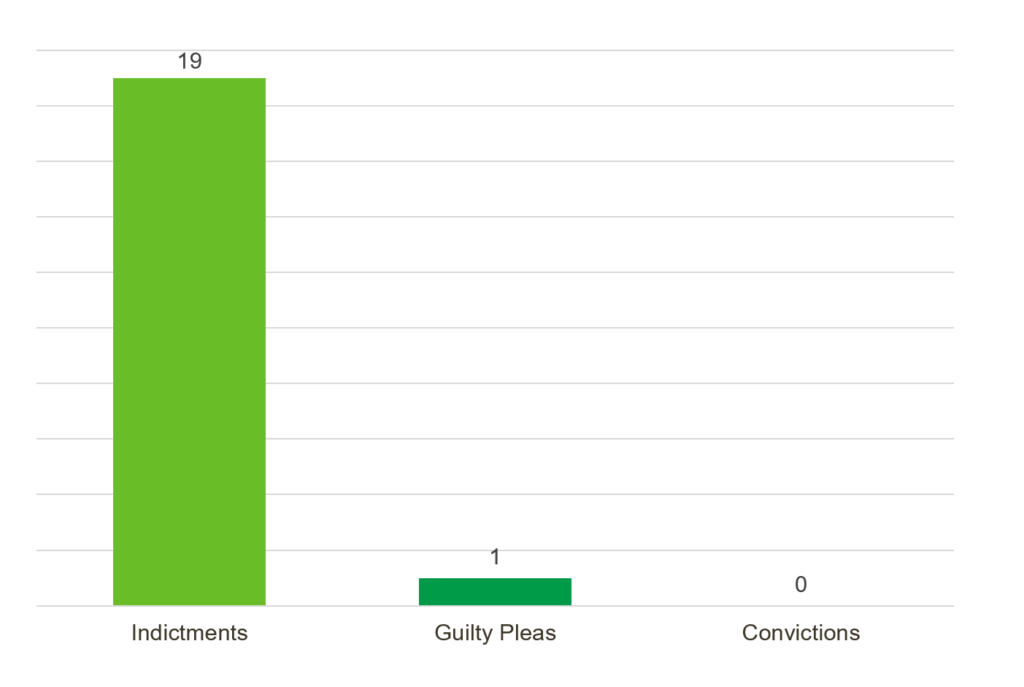
*Source: https://www.justice.gov/news/press-releases. Note: The indictments were brought in seven different litigations.
FTC Civil Enforcement Actions – By the Numbers
The US Federal Trade Commission was also active in challenging allegedly anti-competitive labor-related agreements in 2023, filing lawsuits to prevent three companies from enforcing non-compete agreements in their employee contracts. The agreements at issue applied to a range of workers in the security and glass manufacturing sectors, with a typical duration of one to two years and varying geographic scopes. Each of the defendants agreed to enter into a consent agreement with the FTC to cease enforcing, threatening to enforce, or imposing non-compete restrictions on relevant workers, and to notify all affected employees that they are no longer bound by the restrictions. At least for the time being, these three consent agreements have given the FTC more recent success than the DOJ on labor-related enforcement actions.
State AG Civil Enforcement Actions – By the Numbers
States attorneys general are also pursuing claims against alleged no-poach, no-hire, wage-fixing, and employee non-compete agreements. State AGs in Arizona, California, Colorado, Connecticut, Delaware, District of Columbia, Hawaii, Idaho, Illinois, Iowa, Maine, Maryland, Massachusetts, Michigan, Minnesota, Nebraska, Nevada, New Jersey, New Mexico, New York, North Carolina, Oregon, Pennsylvania, Rhode Island, Vermont, and Washington have filed lawsuits targeting such agreements.
State AG Enforcement Actions (2019-2023)*
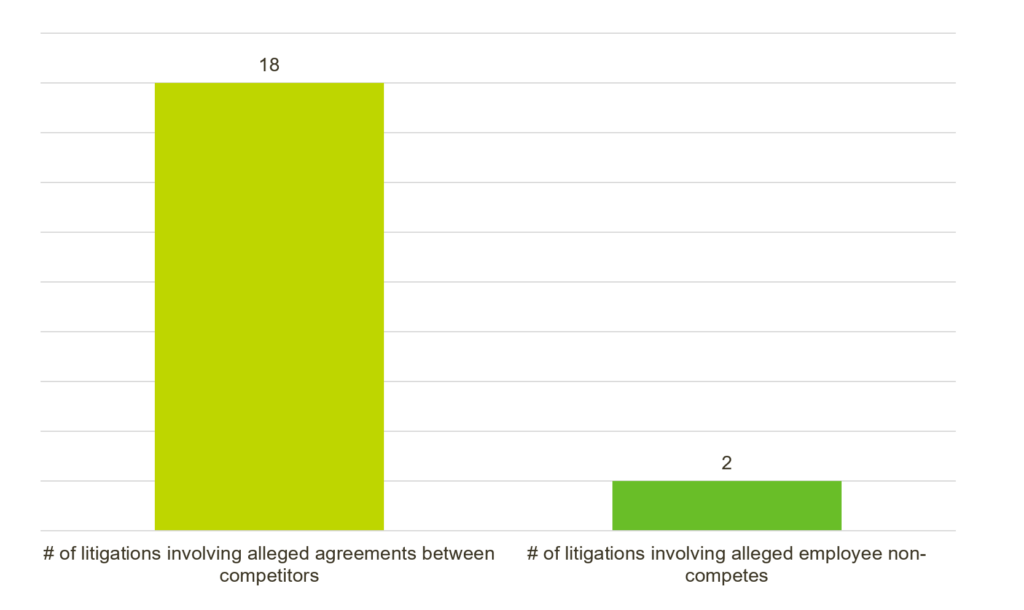
*Based on publicly available information. Note: Alleged anticompetitive agreements between competitors include no-poach, no-hire, and wage-fixing agreements. These figures also include multistate amicus curiae briefs filed by state AGs.
Ultimately, despite mixed results in court to date, we expect that US antitrust agencies and state attorneys general will continue to pursue enforcement actions in this area.
Ex-US Agency Investigations – By the Numbers
Although the US agencies have been leading the way (with mixed results), increased scrutiny of alleged no-poach, no-hire and wage-fixing agreements has become a global trend, with a sharp uptick in investigations in the last three years, especially in Europe.
No-poach/no-hire/wage-fixing investigations opened/dawn raids conducted outside of the US (2017-2023)*
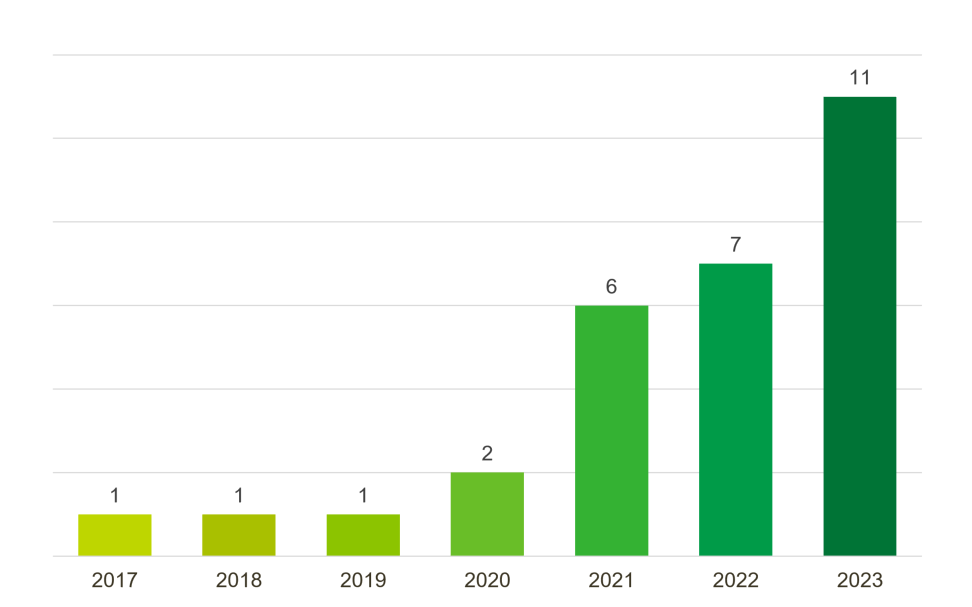
*Based on publicly available information on relevant investigations
Most of the early investigations focused on the sports sector. However, recent scrutiny has spilled over into many other areas, particularly healthcare.
No-poach/no-hire/wage-fixing investigations opened outside of the US by sector (2017-2023)*
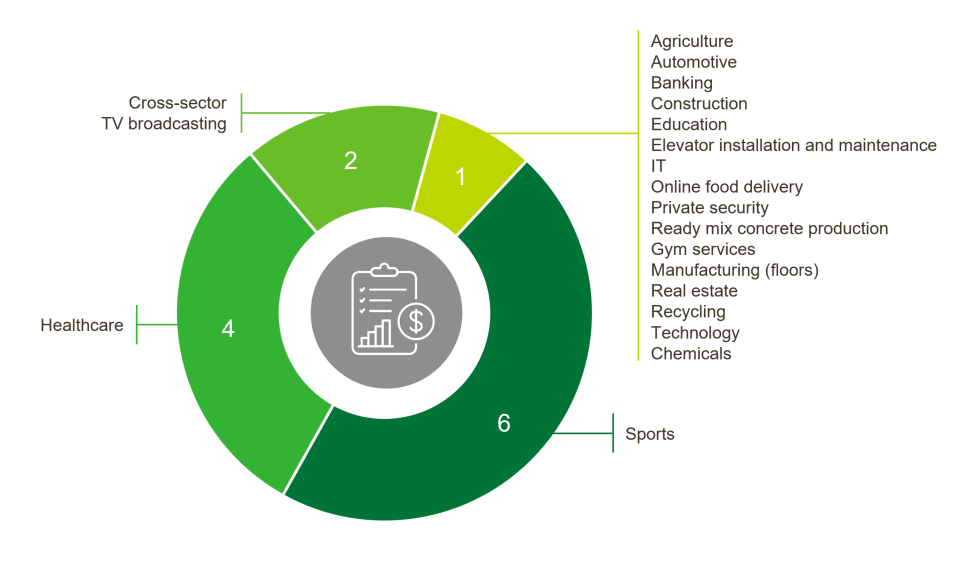
*Based on publicly available information on relevant investigations
Although many of these investigations are still ongoing, we have seen a year-on-year increase in the number of fining decisions, and some significant fines. The French Competition Authority was one of the first national authorities in Europe to sanction no-poach agreements in 2017, as an ancillary part of a wider probe into alleged cartel behavior (predominantly price-fixing) by several floor coverings manufacturers.
Meanwhile, the highest fine has come from the Portuguese authority in 2022. In its first-ever decision against labor market practices, it fined 31 football clubs and the national football league fines totaling €11.3 million for agreeing not to hire players who unilaterally terminated their employment contracts between 2019 and 2020 due to the covid-19 pandemic. While the number of fining decisions has steadily increased, this fine means that 2022 was a record year for total fines. It has recently been reported that – in the first instance of its kind relating to alleged labor markets – the EU Court of Justice has been asked to rule on whether this arrangement restricted competition “by object” (i.e. regardless of any anti-competitive effect), and whether the special nature of sport could mean that any restrictions were justified.
Total number of no-poach/no-hire/wage-fixing fining decisions outside of the US (2017-2023)*
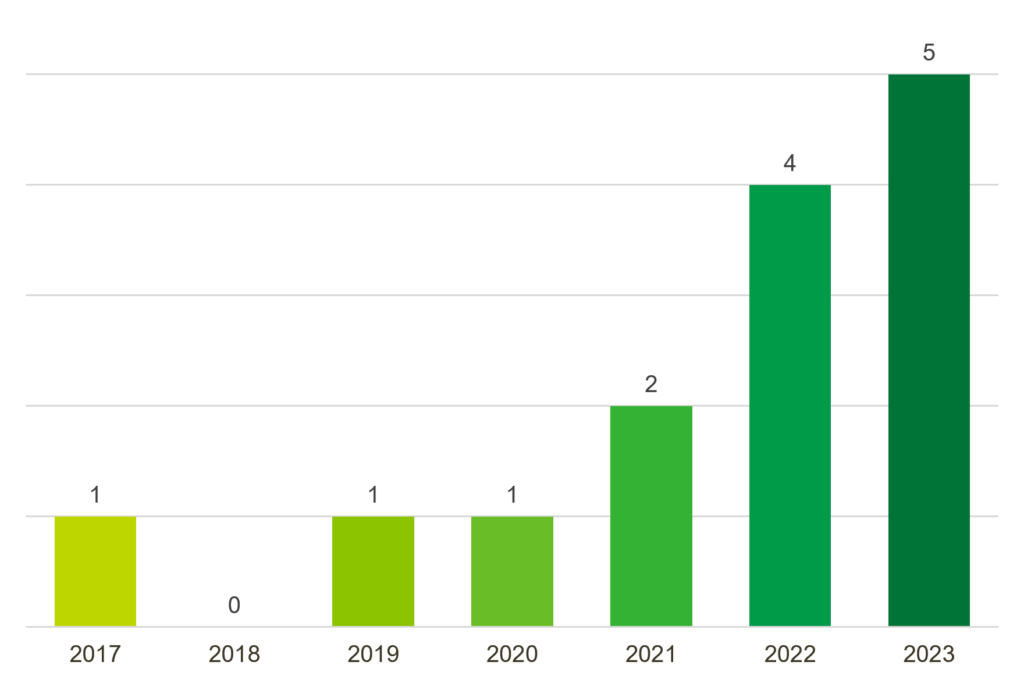
*Based on publicly available information on relevant investigations
Total no-poach/no-hire/wage-fixing fines outside of the US (EUR millions) (2017-2023)*
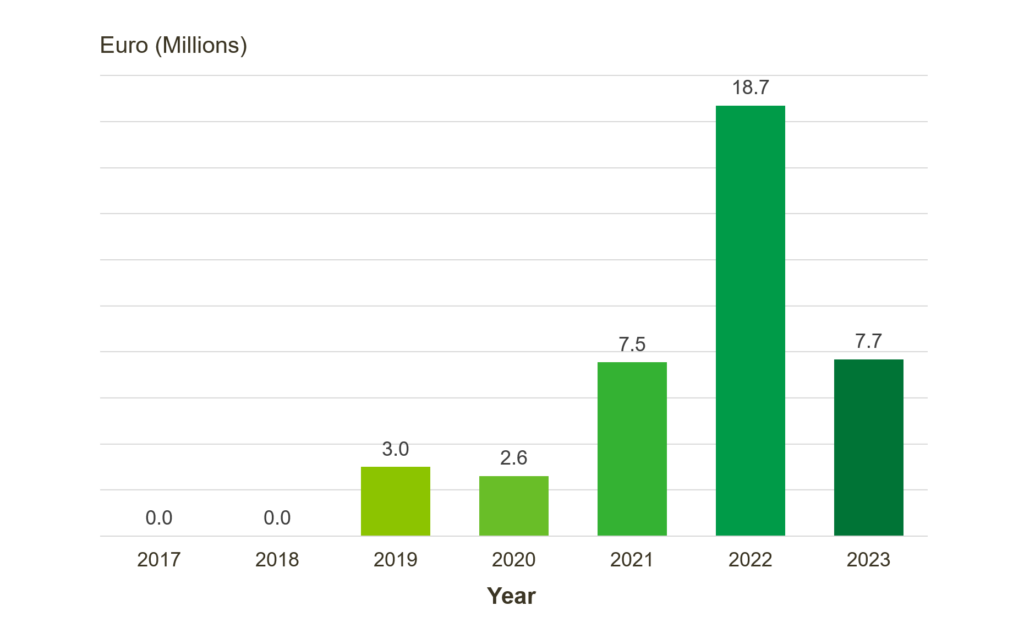
*Based on publicly available information on relevant investigations. We have not included any amount regarding the above-mentioned French Competition Authority’s 2017 fining decision since the proportion of the fine attributable to the HR-related practices is not publicly available.
The Year Ahead: Non-Compete Clauses
On January 5, 2023, the FTC issued a Notice of Proposed Rulemaking that, if it takes effect as is, would purport to effectively ban non-compete clauses from almost all employment contracts. The FTC is not expected to vote on the proposed rulemaking until April 2024. Once finalized, the rule would come into effect 60 days following publication by the FTC in the Federal Register and companies would have to be in compliance 180 days after publication. Any final FTC rule is likely subject to significant legal challenges, and may be suspended and/or invalidated by the courts.
Meanwhile, the UK Government has announced plans to reduce the maximum length of non-compete clauses in employee and worker contracts from twelve to three months – a “direction of travel” endorsed by the UK Competition and Markets Authority following its recent report on Competition and market power in UK labour markets. It is not clear whether the proposals would apply to pre-existing agreements, as with the FTC’s proposal. The anticipated timing also remains to be seen, with the Government legislating “when parliamentary time allows”.
Practical steps to mitigate increased risks
Given the heightened and evolving antitrust risks associated with HR practices including no-poach, no-hire, and wage-fixing agreements, and the potentially serious sanctions for breaches, employers should take steps to mitigate risk, such as:
- Include antitrust counsel when auditing employment and equity agreements to get the full picture about what agreements there are and whether they raise antitrust risk.
- Update antitrust compliance policies to address potential labor risks and adapt training to cover HR, recruitment, and M&A teams dealing with employment issues.
- Establish robust internal reporting processes to allow staff to report potentially problematic labor practices, and seek legal advice when potential issues are discovered to help determine the best path forward.
Contributor(s)






















